True Grit‘s shutout at this weekend’s Academy Awards made me search through the old database to find this top ten…

It’s just an honor to be nominated… Is it really? You’ve heard that expression for years. Let’s face it, the Academy Awards snubs many a film when it posts its nominations. Almost as bad, or in some occasions perhaps worse, is to be nominated for multiple Oscars only to take home none. Hmm… I wonder if someone could create a list of such films. Oh wait, someone just did!
There are actually more films that fit into this category than you might first think. I’ve managed to squeeze 11 onto the list but others also worthy of note include The Grifters, Being John Malkovich, The Natural, Pride & Prejudice, and–still my favorite Paul Thomas Anderson film–Magnolia. That’s what didn’t make the cut. Now check out what did.
10. The Magnificent Seven (1960) / The Great Escape (1963)
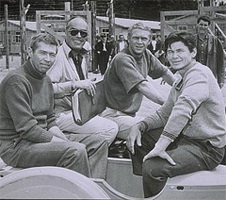 We start out with a pair of films which both only earned a single nomination each, neither taking home the award. One was based on a book, the other was adapted from a Japanese film (which, by the way, also didn’t take home an Oscar). Looking back, you would think that at least one would have won for score (“Great Escape” wasn’t even nominated in that category!), but alas the Academy had other plans. Whether it’s a gang of seven (Yul Brynner, Steve McQueen, Charles Bronson, Robert Vaughn, Horst Buchholz, among others) rescuing a small Mexican town or a group of P.O.W.s (James, Garner, Richard Attenborough, and again Bronson, Coburn, and McQueen) attempting to escape from a Nazi camp, both movies long ago earned the mantle of “classic.” A little McQueen trivia for you: The actor crashed his car to be able to free up time while “injured” to work on “Magnificent Seven,” and performed most of his own motorcycle stunts (including the unique move of “chasing himself” in a double stunt as the hero and also disguised as his a German officer in pursuit) in “Great Escape.”
We start out with a pair of films which both only earned a single nomination each, neither taking home the award. One was based on a book, the other was adapted from a Japanese film (which, by the way, also didn’t take home an Oscar). Looking back, you would think that at least one would have won for score (“Great Escape” wasn’t even nominated in that category!), but alas the Academy had other plans. Whether it’s a gang of seven (Yul Brynner, Steve McQueen, Charles Bronson, Robert Vaughn, Horst Buchholz, among others) rescuing a small Mexican town or a group of P.O.W.s (James, Garner, Richard Attenborough, and again Bronson, Coburn, and McQueen) attempting to escape from a Nazi camp, both movies long ago earned the mantle of “classic.” A little McQueen trivia for you: The actor crashed his car to be able to free up time while “injured” to work on “Magnificent Seven,” and performed most of his own motorcycle stunts (including the unique move of “chasing himself” in a double stunt as the hero and also disguised as his a German officer in pursuit) in “Great Escape.”
Chico: “Ah, that was the greatest shot I’ve ever seen.”
Britt: “The worst! I was aiming at the horse.”
9. The Player (1992)
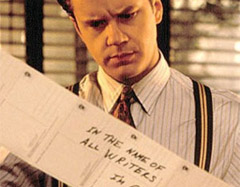 I have some mixed feelings about Robert Altman’s tale of a blackmailed Hollywood exec (Tim Robbins) and his slow descent into paranoia, insanity, and murder. At times it’s utterly brilliant, but I do find the structure of the murder storyline takes over a little too much, getting away from the bitter satire of how Hollywood makes movies. The film earned nominations for directing, editing, and screenplay, but Clint Eastwood put out a little movie that year called “Unforgiven” and “The Player” went home empty-handed.
I have some mixed feelings about Robert Altman’s tale of a blackmailed Hollywood exec (Tim Robbins) and his slow descent into paranoia, insanity, and murder. At times it’s utterly brilliant, but I do find the structure of the murder storyline takes over a little too much, getting away from the bitter satire of how Hollywood makes movies. The film earned nominations for directing, editing, and screenplay, but Clint Eastwood put out a little movie that year called “Unforgiven” and “The Player” went home empty-handed.
Griffin Mill: “I was just thinking what an interesting concept it is to eliminate the writer from the artistic process. If we could just get rid of these actors and directors, maybe we’ve got something here.”
8. Hoosiers (1986)
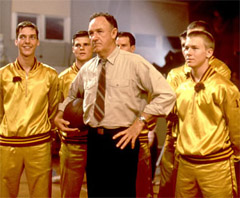 Chances are if you love sports movies–particularly basketball ones–this film will rank near your favorites of the genre. Putting aside the first “Rocky” for the moment, here is the quintessential underdog-makes-good sports tale. Although it did earn nominations for original score and Dennis Hopper, in a supporting role as an alcoholic assistant coach, Gene Hackman’s starring role (Jack Nicholson was originally cast, but had to remove himself because of a scheduling conflict) as the volatile coach getting a second chance was ignored. Over the past two decades, many sports films have tried to recapture the film’s magic but few have had its simplicity, charm, and spirit.
Chances are if you love sports movies–particularly basketball ones–this film will rank near your favorites of the genre. Putting aside the first “Rocky” for the moment, here is the quintessential underdog-makes-good sports tale. Although it did earn nominations for original score and Dennis Hopper, in a supporting role as an alcoholic assistant coach, Gene Hackman’s starring role (Jack Nicholson was originally cast, but had to remove himself because of a scheduling conflict) as the volatile coach getting a second chance was ignored. Over the past two decades, many sports films have tried to recapture the film’s magic but few have had its simplicity, charm, and spirit.
Coach Norman Dale: “Welcome to Indiana basketball.”
7. Frost/Nixon (2008)
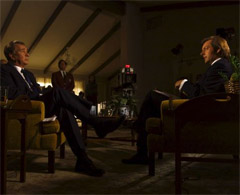 This is the film that spurred the creation of this list. Nominated for five Oscars (for picture, actor, director, screenplay, and editing), “Frost/Nixon” is my favorite Ron Howard film in some time and my choice for best film of 2008. Inspired by the play of the same name, Richard Nixon (Best Actor nominee Frank Langella) is brought down by the most unlikely of knights, a British talk-show host (Michael Sheen) with no political affiliations or agenda. The film hearkens back to one of America’s darkest political eras, and is timely as well, given our former President’s actions in office.
This is the film that spurred the creation of this list. Nominated for five Oscars (for picture, actor, director, screenplay, and editing), “Frost/Nixon” is my favorite Ron Howard film in some time and my choice for best film of 2008. Inspired by the play of the same name, Richard Nixon (Best Actor nominee Frank Langella) is brought down by the most unlikely of knights, a British talk-show host (Michael Sheen) with no political affiliations or agenda. The film hearkens back to one of America’s darkest political eras, and is timely as well, given our former President’s actions in office.
David Frost: “Are you really saying the President can do something illegal?”
Richard Nixon: “I’m saying that when the President does it, that means it’s not illegal!”
6. The Verdict (1982)
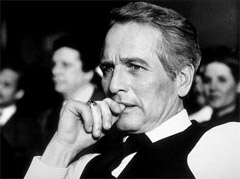 Two words – Paul Newman. Nominated for five Oscars (Newman, Supporting Actor nominee James Mason, Director Sidney Lumet, picture, and screenplay), this courtroom drama had the same number of statues after the show as it did before. With strong competition from the likes of “Gandhi,” “E.T.,” and Dustin Hoffman in “Tootsie” (Damn, 1982 was a good year!), the film simply got squeezed out on Oscar night. If you’ve never seen it, rent it. And if you’ve got a copy on DVD, and some free time on your hands, you might want to keep an eye out for uncredited extras Bruce Willis and Tobin Bell.
Two words – Paul Newman. Nominated for five Oscars (Newman, Supporting Actor nominee James Mason, Director Sidney Lumet, picture, and screenplay), this courtroom drama had the same number of statues after the show as it did before. With strong competition from the likes of “Gandhi,” “E.T.,” and Dustin Hoffman in “Tootsie” (Damn, 1982 was a good year!), the film simply got squeezed out on Oscar night. If you’ve never seen it, rent it. And if you’ve got a copy on DVD, and some free time on your hands, you might want to keep an eye out for uncredited extras Bruce Willis and Tobin Bell.
Frank Galvin: “He’s a good man…”
Mickey Morrissey: “He’s a good man? Heh, heh, he’s the Prince of fucking Darkness! He’ll have people testifying they saw her water-skiing in Marblehead last summer. Now look, Frank, don’t fuck with this case!”
5. Munich (2005)
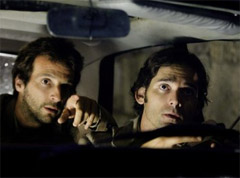 2005 was a damn fine year for film. (You’ll find another from this crop down the list.) Steven Spielberg’s take on the aftermath of the killings at the 1972 Munich Olympics follows a band of Israeli assassins (Eric Bana, Daniel Craig, Ciaran Hinds, Matthieu Kassovitz, and Hans Zischler) who are put together to strike back at the terrorists responsible. Like the others on this list, the film took home none of the Oscars for which it was nominated (picture, director, screenplay, score, and editing–yet not a single acting nom!). “Munich” is a punch in the stomach that takes a hard look at terrorism and vengeance and the corrupting effects of both on good people.
2005 was a damn fine year for film. (You’ll find another from this crop down the list.) Steven Spielberg’s take on the aftermath of the killings at the 1972 Munich Olympics follows a band of Israeli assassins (Eric Bana, Daniel Craig, Ciaran Hinds, Matthieu Kassovitz, and Hans Zischler) who are put together to strike back at the terrorists responsible. Like the others on this list, the film took home none of the Oscars for which it was nominated (picture, director, screenplay, score, and editing–yet not a single acting nom!). “Munich” is a punch in the stomach that takes a hard look at terrorism and vengeance and the corrupting effects of both on good people.
Robert: “We are supposed to be righteous. That’s a beautiful thing. And we’re losing it. If I lose that, that’s everything. That’s my soul.”
4. North by Northwest (1959)
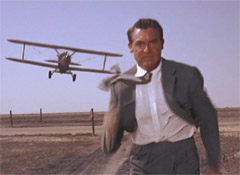 Everyone has their favorite Hitchcock film. This is mine. Although the film current ranks #28 on IMDb’s top 250-rated films and earned a spot on AFI’s Top 100 Films, on Oscar night it went unrecognized, unable to win in the three categories (editing, art direction, and screenplay) in which it was nominated. Some films are great. Some films are filled with great moments. “North by Northwest” is both. From the insanity of the situation, Roger Thornhill (Cary Grant) finds himself in to the iconic images of running from the crop duster and climbing around Mt. Rushmore, this one’s got it all: suspense, humor, thrills, drama, and romance with the beautiful Eva Marie Saint. The film was also the inspiration for my favorite Gene Wilder/Richard Pryor team-up. It also an example of my “movies with trains theory,” but that’s another list. (I’ll explain that in the comments below if anyone is curious.)
Everyone has their favorite Hitchcock film. This is mine. Although the film current ranks #28 on IMDb’s top 250-rated films and earned a spot on AFI’s Top 100 Films, on Oscar night it went unrecognized, unable to win in the three categories (editing, art direction, and screenplay) in which it was nominated. Some films are great. Some films are filled with great moments. “North by Northwest” is both. From the insanity of the situation, Roger Thornhill (Cary Grant) finds himself in to the iconic images of running from the crop duster and climbing around Mt. Rushmore, this one’s got it all: suspense, humor, thrills, drama, and romance with the beautiful Eva Marie Saint. The film was also the inspiration for my favorite Gene Wilder/Richard Pryor team-up. It also an example of my “movies with trains theory,” but that’s another list. (I’ll explain that in the comments below if anyone is curious.)
Roger Thornhill: “Now you listen to me, I’m an advertising man, not a red herring. I’ve got a job, a secretary, a mother, two ex-wives and several bartenders that depend upon me, and I don’t intend to disappoint them all by getting myself slightly killed.”
3. Good Night, and Good Luck (2005)
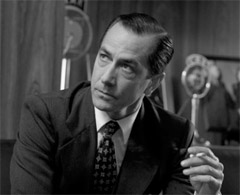 I loved this movie enough to list it #1 on my Top Films of 2005, which was a strong year which included the aforementioned “Munich.” Although the film garnered some love by earning itself six nominations (including cinematography, screenplay, picture, director for George Clooney, and actor for David Strathairn), at the end of the night, “Good Luck” went home empty-handed. Every choice in this film is the right one, including the look and style of the film and the choice to use archival footage of Sen. Joseph McCarthy rather than cast an actor for the role. Clooney’s brilliant masterpiece was the best film of 2005, and centered around the historic battle of wills between journalist Edward R. Murrow (Strathairn) and McCarthy at the height of the Red Scare. It was also timely for a world with growing concern about an individual’s basic rights to privacy, and it served as an indictment and warning to a generation growing up in the current, dumbed-down TV culture.
I loved this movie enough to list it #1 on my Top Films of 2005, which was a strong year which included the aforementioned “Munich.” Although the film garnered some love by earning itself six nominations (including cinematography, screenplay, picture, director for George Clooney, and actor for David Strathairn), at the end of the night, “Good Luck” went home empty-handed. Every choice in this film is the right one, including the look and style of the film and the choice to use archival footage of Sen. Joseph McCarthy rather than cast an actor for the role. Clooney’s brilliant masterpiece was the best film of 2005, and centered around the historic battle of wills between journalist Edward R. Murrow (Strathairn) and McCarthy at the height of the Red Scare. It was also timely for a world with growing concern about an individual’s basic rights to privacy, and it served as an indictment and warning to a generation growing up in the current, dumbed-down TV culture.
Edward R. Murrow: “But even if they are right, what have they got to lose? Because if they are right, and this instrument is good for nothing but to entertain, amuse and insulate, then the tube is flickering now and we will soon see that the whole struggle is lost. This instrument can teach, it can illuminate; yes, and it can even inspire. But it can do so only to the extent that humans are determined to use it to those ends. Otherwise it is merely wires and lights in a box.”
2. The Color Purple (1985)
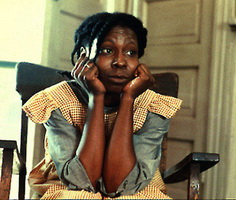 It’s not the best movie on the list, but it’s by far the most snubbed. I’m not one to argue that this is Steven Spielberg’s best film, but 11 nominations and not a single win? Really? Only one other film in Oscar history shares that honor. Although many critics chose it as the best movie of the year, the film wasn’t without controversy because some in the African-American community argued passionately against Spielberg being the right choice to helm the project, based on a novel about an abused black woman in the first half of the 20th century. Although Whoopi would eventually go on to grab an Oscar by talking to Patrick Swayze’s “Ghost,” the film itself received no love from the Academy on its special night, going a whopping 0 for 11.
It’s not the best movie on the list, but it’s by far the most snubbed. I’m not one to argue that this is Steven Spielberg’s best film, but 11 nominations and not a single win? Really? Only one other film in Oscar history shares that honor. Although many critics chose it as the best movie of the year, the film wasn’t without controversy because some in the African-American community argued passionately against Spielberg being the right choice to helm the project, based on a novel about an abused black woman in the first half of the 20th century. Although Whoopi would eventually go on to grab an Oscar by talking to Patrick Swayze’s “Ghost,” the film itself received no love from the Academy on its special night, going a whopping 0 for 11.
Shug: “I think it pisses God off when you walk by the color purple in a field and don’t notice it.”
1. Dr. Strangelove or: How I Learned to Stop Worrying and Love the Bomb (1964)
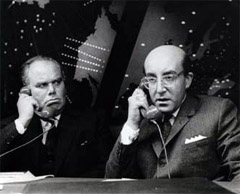 Wow. Four nominations (Peter Sellers, picture, director, and screenplay) and not a single win. Wow. No matter how many different ways I put together my favorite ten films ever made, Stanley Kubrick’s satire on nuclear war always finds its way near the top. Peter Sellers is so good in three separate performances that my favorite one changes from viewing to viewing. George C. Scott displays tremendous comic timing, Slim Pickens plays it straight (he wasn’t told the film was a comedy) and Sterling Hayden teaches us all about the terrors of flouridation (the horror!). Simply put, “Dr. Strangelove” was way ahead of its time. Had this movie been made today, it would be appreciated in a different light completely.
Wow. Four nominations (Peter Sellers, picture, director, and screenplay) and not a single win. Wow. No matter how many different ways I put together my favorite ten films ever made, Stanley Kubrick’s satire on nuclear war always finds its way near the top. Peter Sellers is so good in three separate performances that my favorite one changes from viewing to viewing. George C. Scott displays tremendous comic timing, Slim Pickens plays it straight (he wasn’t told the film was a comedy) and Sterling Hayden teaches us all about the terrors of flouridation (the horror!). Simply put, “Dr. Strangelove” was way ahead of its time. Had this movie been made today, it would be appreciated in a different light completely.
President Merkin Muffley: “General Turgidson, I find this very difficult to understand. I was under the impression that I was the only one in authority to order the use of nuclear weapons.”
General “Buck” Turgidson: “That’s right, sir, you are the only person authorized to do so. And although I, uh, hate to judge before all the facts are in, it’s beginning to look like, uh, General Ripper exceeded his authority.”

Nice info. Can’t bellieve North By Northwest didn’t win a single academy award. I call shenanigans!
What a list of movies this is. Wow. So great to remember that the best movies don’t always win.